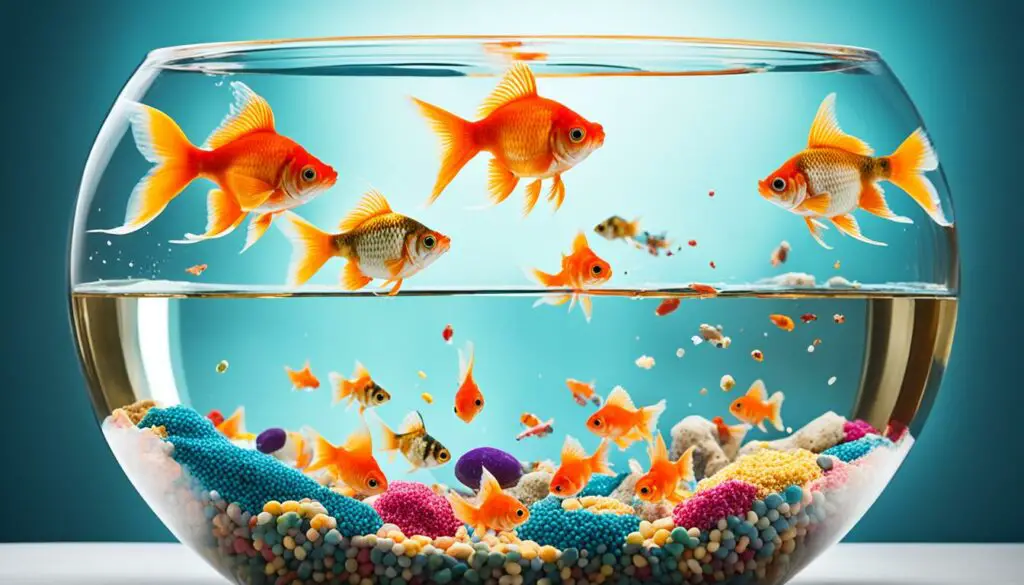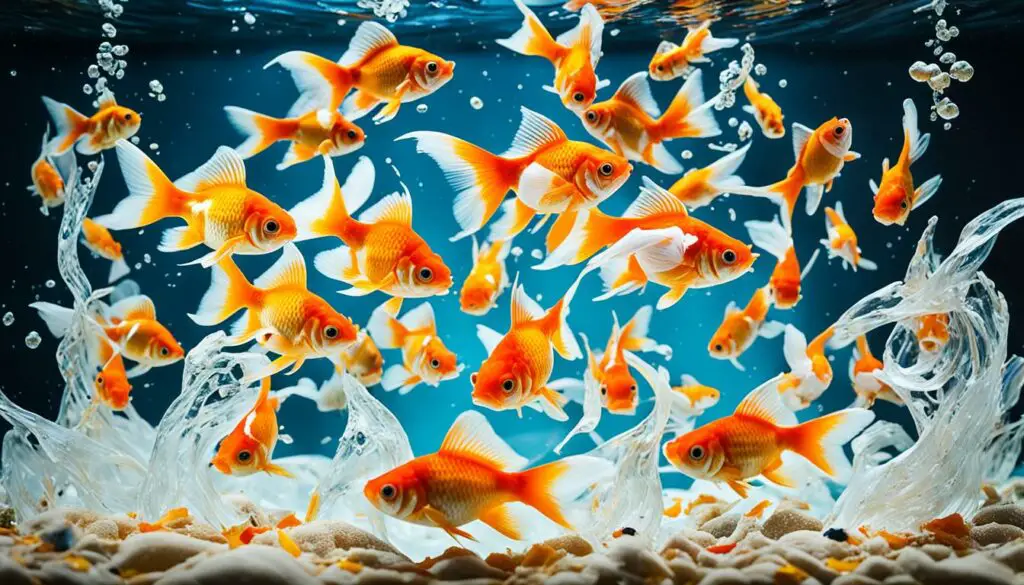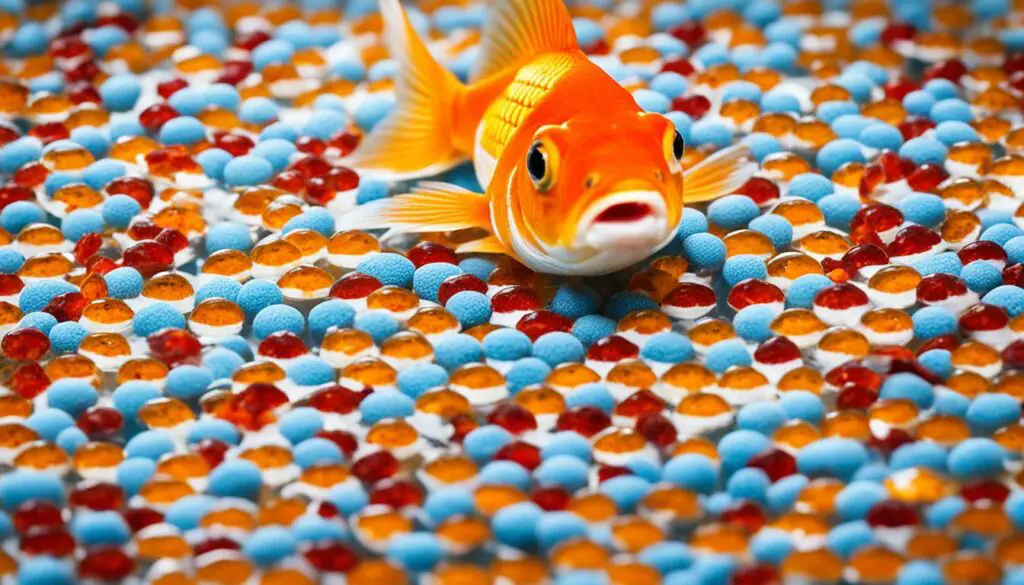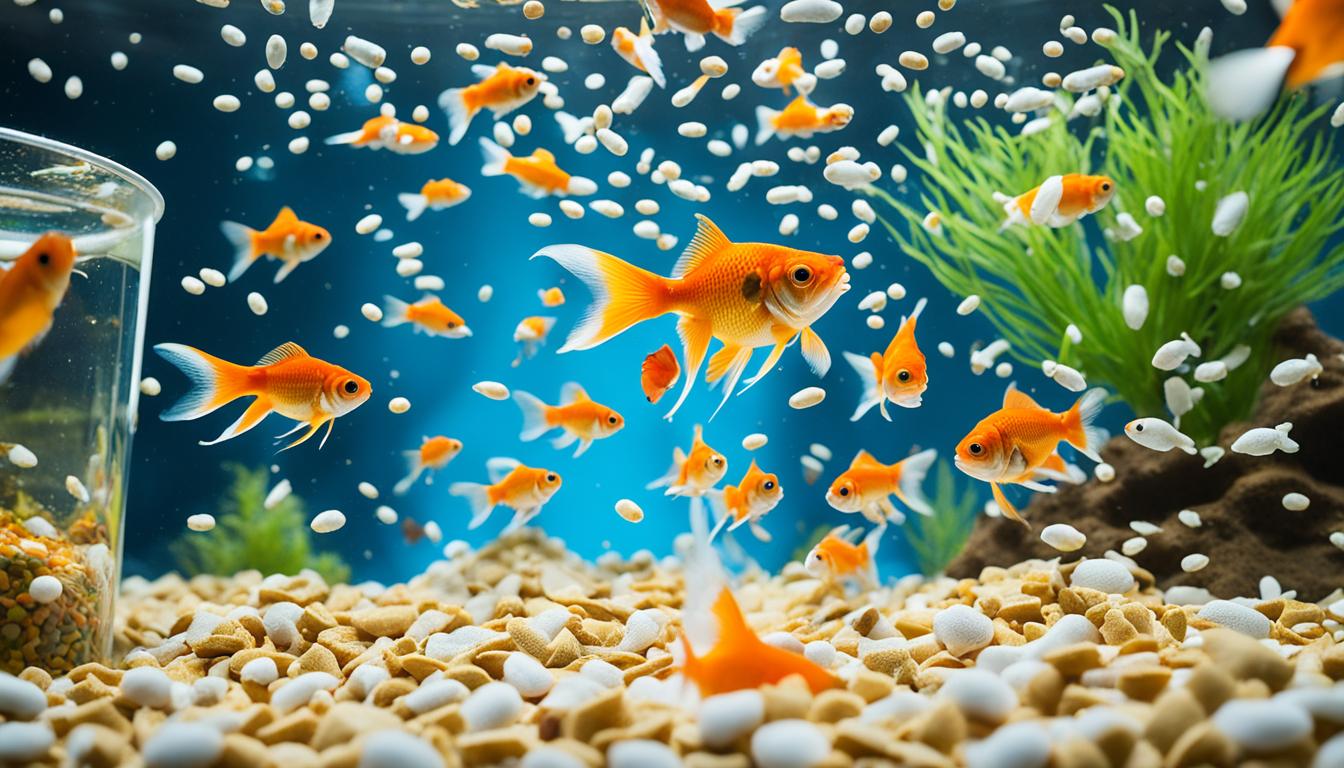Last Updated on 1 year by admin
If you’re a goldfish owner, you may be wondering if it’s safe for your finned friend to eat tropical fish food. After all, it’s important to provide your goldfish with a nutritious diet that meets their specific dietary needs.
Goldfish can technically eat tropical fish flakes without any immediate health effects. However, tropical fish food is not the most suitable option for their long-term health and well-being. It’s crucial to understand the differences between goldfish and tropical fish and their dietary requirements.
Key Takeaways:
- – Goldfish can eat tropical fish flakes without immediate harm.
- – Tropical fish food does not meet the specific dietary needs of goldfish.
- – Goldfish require a diet with a moderate amount of protein and high fiber content.
- – Goldfish-based food is more suitable and nutritionally balanced for goldfish.
- – Offering a varied diet including natural live food and aquatic plants is beneficial for goldfish health.
The Goldfish Diet: A Brief Overview

Goldfish are opportunistic omnivores and have a diverse diet in the wild, consisting of plants, algae, insects, and small fish. To ensure the well-being of your goldfish, it’s important to replicate their natural diet by providing a balanced and nutritious feeding routine. A proper goldfish diet should include a combination of protein-rich foods and plant-based options, promoting their overall health and aiding in digestion.
Goldfish require a moderate amount of protein in their diet to support growth, energy, and the development of healthy muscles. However, it’s crucial to strike a balance and not provide an excessive amount of protein, as it can lead to digestive issues and other health problems. In addition to protein, goldfish also require a high-fiber diet to stimulate their digestive system and prevent blockages.
Goldfish need a diet with a moderate amount of protein and high fiber content to promote their health and digestion.
Protein-Rich Foods for Goldfish
When selecting protein sources for your goldfish, opt for high-quality fish-based flakes or pellets that are specifically formulated for goldfish. These products provide the necessary protein, vitamins, and minerals without overloading the digestive system. Look for options that mention “goldfish” or “pond fish” on the packaging, ensuring that the food is tailored to their specific dietary needs.
Some examples of protein-rich foods suitable for goldfish include:
- Goldfish flakes or pellets
- Freeze-dried or frozen bloodworms
- Brine shrimp
- Daphnia
Plant-Based Foods for Goldfish
Goldfish also require a variety of plant-based foods to promote optimal health. Including plant matter in their diet provides essential fiber, vitamins, and minerals. It is recommended to offer a mix of fresh and cooked vegetables to ensure a well-rounded diet. Some suitable options include:
- Peas
- Lettuce
- Spinach
- Zucchini
- Nori seaweed
Feeding live or blanched vegetables helps mimic their natural foraging behavior and provides additional enrichment.
A Balanced Approach to Feeding
To maintain a healthy balance in their diet, it is advisable to feed your goldfish a combination of protein-rich foods and plant-based options. This can be achieved by offering fish-based flakes or pellets as the main staple, supplemented with occasional treats of live food or blanched vegetables. Remember to feed your goldfish in moderation, only providing the amount they can consume within a few minutes to prevent overfeeding and water quality issues.
| Protein-Rich Foods | Plant-Based Foods |
|---|---|
| Goldfish flakes or pellets | Peas |
| Freeze-dried or frozen bloodworms | Lettuce |
| Brine shrimp | Spinach |
| Daphnia | Zucchini |
| Nori seaweed |
Ensure that the food you offer is appropriate for goldfish and avoid any products specifically designed for other fish species, as these may not meet their nutritional requirements.
By providing a balanced and varied diet, you can ensure the optimal nutrition and health of your goldfish, allowing them to thrive in their aquatic environment.
Tropical Fish Food vs Goldfish Food: The Core Differences

When it comes to feeding your goldfish, it’s important to understand the core differences between tropical fish food and goldfish food. While both types of food may seem similar, they have distinct variations in terms of protein, fiber, and carbohydrate content.
Tropical fish food is typically higher in protein, which may not be suitable for goldfish. Excessive protein intake can lead to digestive issues in goldfish, such as bloating and swim bladder problems. Goldfish have specific dietary requirements that prioritize a higher fiber content in their food.
Goldfish food, on the other hand, is specifically formulated to cater to the nutritional needs of goldfish. It contains a higher fiber content, aiding in digestion and promoting overall gut health. A balanced diet of goldfish food ensures that your goldfish receives the essential nutrients they need for optimal growth and well-being.
Goldfish food is available in various forms, such as flakes and sinking pellets, to mimic the feeding behavior of goldfish in their natural habitat. This allows goldfish to actively swim and forage for their food, contributing to their mental stimulation and overall vitality.
| Tropical Fish Food | Goldfish Food |
|---|---|
| Higher protein content | Higher fiber content |
| Lacks sufficient fiber for goldfish digestion | Supports healthy digestion |
| May cause digestive issues in goldfish | Promotes optimal gut health |
| Designed for the dietary needs of tropical fish | Specifically formulated for goldfish nutrition |
Choose Goldfish Food for Your Goldfish’s Optimal Health
When it comes to feeding your goldfish, it is essential to prioritize their health and well-being. By selecting goldfish food that meets their specific nutritional requirements, you can ensure that your goldfish thrives in their aquarium environment.
Feeding your goldfish a balanced diet of goldfish food not only supports their digestion but also provides them with the essential nutrients they need for growth and immune function. Remember to offer a variety of foods to mimic their natural diet, such as live food, frozen food, or freeze-dried food, to provide enrichment and satisfy their natural foraging instincts.
By understanding the core differences between tropical fish food and goldfish food, you can make informed decisions about what to feed your goldfish to ensure their optimal health and nutrition.
Goldfish and Alternative Food Options

While goldfish can technically eat tropical fish flakes, it is not the best option for their health. There are alternative food options that are more suitable for goldfish, such as goldfish flakes and pellets.
Goldfish flakes and pellets are specifically formulated to meet the nutritional needs of goldfish. They contain a balanced amount of protein and fiber, providing the necessary nutrients for optimal growth and digestion.
In addition to goldfish-specific food, offering natural live food, frozen food, or freeze-dried food can provide enrichment and mimic their natural diet. Bloodworms and brine shrimp are popular choices for goldfish and can be found in freeze-dried form at pet stores.
Another way to enhance goldfish nutrition is by including algae and aquatic plants in their diet. Goldfish are herbivorous and consuming algae and plants helps promote their overall health and provides essential vitamins and minerals.
Remember to gradually introduce new foods to your goldfish and observe their response. It is crucial to maintain a varied diet to ensure they receive a wide range of nutrients. Below is a table highlighting the different food options for goldfish:
| Food Option | Description |
|---|---|
| Goldfish Flakes | A staple diet specifically formulated for goldfish, containing a balanced mix of protein and fiber. |
| Goldfish Pellets | Sinking pellets that offer a well-rounded nutrition for goldfish, available in different sizes. |
| Live Food | Natural food sources such as daphnia, brine shrimp, and bloodworms. Ensure they are from reputable sources to avoid introducing parasites. |
| Frozen Food | Freezing maintains the nutritional value of live food and offers a convenient alternative. Examples include frozen brine shrimp or bloodworms. |
| Freeze-Dried Food | Available in a dehydrated freeze-dried form, these include bloodworms, brine shrimp, and daphnia. |
| Algae and Aquatic Plants | Provide a source of fiber, vitamins, and minerals. Options include spirulina, duckweed, and blanched vegetables like lettuce or spinach. |
By incorporating these alternative food options into your goldfish’s diet, you can ensure they receive a well-rounded and nutritious meal plan. Remember to observe your goldfish’s behavior and adjust the feeding amounts accordingly to maintain their health and vitality.
Our Verdict on Goldfish and Tropical Flakes

After considering the nutritional needs of goldfish and the composition of tropical flakes, our verdict is clear: while goldfish can eat tropical flakes, it is not recommended as a long-term staple food.
The protein content in tropical flakes is higher than what goldfish require, which can lead to digestive issues. Goldfish are omnivorous and need a balanced diet that includes the right amount of protein and high fiber content for optimal health and digestion. Tropical flakes lack the necessary fiber that goldfish need for proper digestion.
To meet the specific nutritional needs of goldfish, it is best to provide them with a diet that includes goldfish-based flakes or pellets. These specialized foods are formulated to contain the ideal balance of protein and fiber for goldfish. By feeding goldfish-based flakes or pellets, you can ensure that your goldfish are receiving the essential nutrients they need to thrive.
Benefits of a Balanced Goldfish Diet
Feeding your goldfish a balanced diet has numerous benefits for their overall health and well-being. Here are some key advantages:
- Enhanced Digestion: The high fiber content in goldfish-based flakes or pellets promotes healthy digestion and prevents constipation.
- Vibrant Colors: A well-rounded diet contributes to the vibrant colors that goldfish are known for.
- Strong Immune System: Proper nutrition strengthens the immune system, helping goldfish resist diseases and infections.
- Longer Lifespan: By providing the right nutrients, you can potentially extend the lifespan of your goldfish.
Remember, goldfish deserve a diet that meets their specific nutritional requirements. By choosing goldfish-based flakes or pellets, you can ensure that your goldfish receive the proper nutrition they need for a healthy and fulfilling life.
| Goldfish Food | Protein Content (%) | Fiber Content (%) |
|---|---|---|
| Goldfish-Based Flakes | 30 | 5 |
| Goldfish Pellets | 35 | 6 |
| Tropical Flakes | 40 | 2 |
Expert Insight
“Goldfish have specific dietary requirements that differ from tropical fish. Feeding them tropical flakes may lead to nutritional imbalances, digestive issues, and potential health problems. It is crucial to provide goldfish with a diet specifically designed to meet their needs, such as goldfish-based flakes or pellets.”
In summary, while goldfish can eat tropical flakes, it is not recommended as their primary food source. To ensure the health and well-being of your goldfish, opt for a balanced diet that includes goldfish-based flakes or pellets. By doing so, you’ll provide your goldfish with the essential nutrients they need to thrive.
Trying Tetra Products: Tetramin and Tetra Flakes
When it comes to feeding your goldfish, it’s essential to choose the right food that meets their specific nutritional needs. While Tetra offers various fish foods, it’s important to understand that not all products are suitable for goldfish, including Tetramin Tropical Flakes and Tetra Color Tropical Flakes.
While goldfish can technically eat these products, they are primarily designed for tropical fish and may not provide all the necessary nutrients for goldfish health and well-being. Goldfish have unique dietary requirements, including a balanced protein, fiber, and carbohydrate content.
Instead, it is recommended to choose goldfish-specific flakes or pellets to ensure their optimal health. Goldfish food is specially formulated to meet their nutritional needs and is available in a variety of options that provide the necessary protein, fiber, and carbohydrates.
Here are some goldfish-specific food options:
- Goldfish flakes: These flakes are formulated to provide a balanced diet for goldfish and can be easily consumed.
- Goldfish pellets: Pellets are another popular option, and they sink in water, mimicking the feeding behavior of goldfish. They are packed with essential nutrients and provide a well-rounded diet.
By choosing goldfish-specific flakes or pellets, you can ensure that your goldfish receives the necessary nutrition for their overall health and well-being.
Remember, goldfish are not able to digest food as efficiently as tropical fish, so it’s vital to provide them with a diet that meets their specific dietary needs.
In addition to goldfish flakes and pellets, it’s also beneficial to incorporate natural live food, frozen food, or freeze-dried food into their diet. These options, such as bloodworms and brine shrimp, can provide enrichment and mimic their natural feeding behavior.
Furthermore, including algae and aquatic plants in their diet can help promote a healthy digestive system and enhance their overall health.
The importance of a balanced diet for goldfish
Feeding your goldfish a balanced diet is crucial for their health and longevity. A proper diet ensures they receive the right amount of nutrients, vitamins, and minerals necessary for their growth and immune system.
A well-balanced diet for goldfish should consist of:
- Protein: Goldfish require a moderate amount of protein for muscle growth and development.
- Fiber: Fiber aids in digestion and helps prevent constipation, a common issue in goldfish.
- Carbohydrates: Carbohydrates provide energy for daily activities and keep your goldfish active and healthy.
Providing a varied diet that includes goldfish-specific flakes or pellets, along with natural live food and aquatic plants, will ensure that your goldfish receives all the necessary nutrients for optimal health and well-being.
Remember, choosing the right food for your goldfish is essential. By offering a balanced and species-appropriate diet, you can help your goldfish thrive and live a healthy life.
Final Thoughts: Best Feeding Practices for Goldfish
When it comes to goldfish feeding, it is crucial to ensure they receive a balanced and varied diet that meets their specific nutritional needs. Providing them with the right food not only promotes their overall health but also enhances their natural behaviors and vibrant colors. Here are some best practices to keep in mind:
- Goldfish-based flakes or pellets: Opt for high-quality goldfish food that is specifically formulated to meet their dietary requirements. Look for options that contain a balanced combination of protein, fiber, and carbohydrates to support their growth and digestion.
- Incorporate natural live food: Supplement their diet with occasional live food such as brine shrimp, bloodworms, or daphnia. These natural treats provide enrichment, stimulate their foraging instincts, and mimic their diet in the wild.
- Include frozen or freeze-dried food: Offer freeze-dried or frozen food options like daphnia, brine shrimp, or krill. These foods are convenient and retain much of their nutritional value, providing your goldfish with a diverse diet.
- Add algae and aquatic plants: Introduce algae wafers or blanched vegetables like spinach, peas, or lettuce into their feeding routine. These plant-based foods are rich in fiber and help maintain a healthy digestive system.
By following these feeding practices, you can ensure that your goldfish receive the necessary nutrients for optimal health and vitality. Remember to monitor their feeding habits and adjust the portions accordingly to prevent overfeeding, as this can lead to health issues such as poor water quality and obesity.
Tip: Remember to only feed your goldfish what they can consume in a few minutes to avoid food waste and water contamination. Remove any uneaten food from the tank promptly.
Providing a well-rounded diet not only ensures the proper growth and development of your goldfish but also enriches their lives. Keep in mind that each goldfish is unique, so it may take time to find the perfect balance of foods that suits your fish’s preferences and dietary needs.
Next, we will conclude the article and summarize the key takeaways regarding feeding goldfish a tropical fish food diet.
Conclusion
While goldfish can technically eat tropical fish flakes, it is not the most suitable option for their long-term health. Goldfish require a balanced and species-appropriate diet that includes goldfish-based flakes or pellets to ensure they receive the necessary nutrients for optimal health and digestion.
Feeding goldfish tropical fish food can lead to digestive issues due to the high protein content and lack of sufficient fiber. It is important to follow best feeding practices and provide goldfish with a diverse and nutritious diet. This can include offering natural live food, frozen food, or freeze-dried food such as bloodworms and brine shrimp, as well as incorporating algae and aquatic plants in their diet.
By prioritizing goldfish nutrition and choosing the right food options, you can help your goldfish thrive and live a healthy life. Remember to consult with a veterinarian or pet care specialist for personalized advice on goldfish feeding and nutrition.
FAQ
Can goldfish eat tropical fish food?
Goldfish can safely eat tropical fish flakes with no immediate health effects. However, tropical fish flakes are not the most nutritious option for goldfish as they do not meet their specific dietary requirements.
What is the ideal diet for goldfish?
Goldfish are naturally omnivorous and require a diet with a moderate amount of protein and high fiber content. It is important to provide goldfish with species-appropriate staple diets that include goldfish-based food.
What do goldfish eat in the wild?
In the wild, goldfish consume a variety of foods including plants, algae, insects, and small fish. To mimic their natural diet, it is important to feed them a balanced diet that includes both protein and plant-based foods.
How does tropical fish food differ from goldfish food?
Tropical fish food and goldfish food have core differences in terms of their protein, fiber, and carbohydrate content. Tropical fish food is higher in protein, which is not suitable for goldfish as it can cause digestive issues. Goldfish food, on the other hand, has a higher fiber content and is specifically formulated to meet the dietary needs of goldfish.
Are there alternative food options for goldfish?
Yes, there are alternative food options that are more suitable for goldfish, such as goldfish flakes and pellets. Additionally, offering natural live food, frozen food, or freeze-dried food like bloodworms and brine shrimp can provide enrichment and mimic their natural diet.
Can goldfish eat tropical fish flakes as a long-term staple food?
While goldfish can technically eat tropical fish flakes, it is not recommended as a long-term staple food. The protein content in tropical flakes is higher than what goldfish require, and the low fiber content can lead to digestive issues.
Can goldfish eat Tetra’s Tropical Flakes?
Tetra offers various fish foods, including Tetramin Tropical Flakes and Tetra Color Tropical Flakes. While goldfish can technically eat these products, they are primarily designed for tropical fish and may not meet all the nutritional needs of goldfish.
What are the best feeding practices for goldfish?
When it comes to feeding goldfish, it is important to provide them with a balanced and varied diet that meets their specific dietary needs. This includes offering goldfish-based flakes or pellets that have a balanced protein, fiber, and carbohydrate content. Additionally, incorporating natural live food, frozen food, or freeze-dried food can provide enrichment and mimic their natural diet.
What is the conclusion regarding goldfish and tropical fish food?
Goldfish can technically eat tropical fish flakes, but it is not the most suitable option for their long-term health. It is best to provide goldfish with a balanced and species-appropriate diet that includes goldfish-based flakes or pellets.
Source Links
- https://www.hepper.com/can-goldfish-eat-tropical-fish-flakes/
- https://www.aquariadise.com/can-goldfish-eat-tropical-fish-food/
- https://thegoldfishtank.com/goldfish-food/can-goldfish-eat-tropical-flakes/

